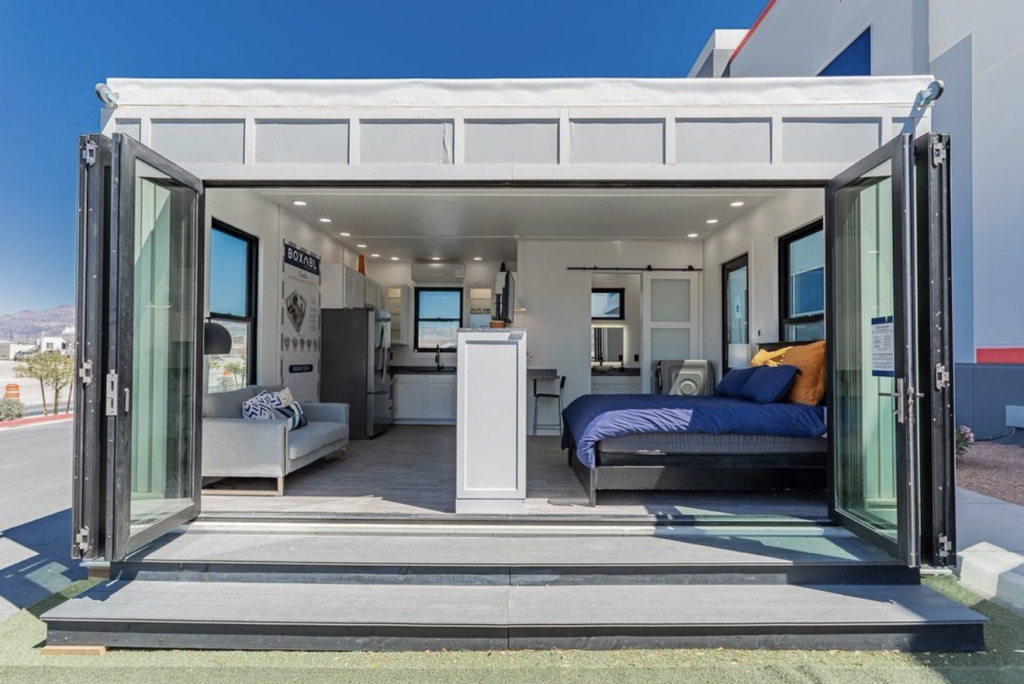Tesla Homes For Modern Living Newly Released $10,000 Tiny House
Tesla Homes For Modern Living Newly Released $10,000 Tiny House
Blog Article
Tesla Homes With Solar Technology Integration Newly Released $10,000 Tiny House

Tiny home residing continues to gain reputation, drawing folks seeking affordability, simplicity, and sustainability. However, there are quite a few legal concerns for tiny home dwelling that must not be overlooked. As people transition into this minimalist life-style, it is important to navigate the complexities of zoning laws, building codes, and land use laws.
Zoning legal guidelines dictate how land can be used in a selected space, affecting where tiny homes could be positioned. In many municipalities, conventional zoning rules don't account for the distinctive nature of tiny homes. This inconsistency can result in challenges when trying to put a tiny home on lots. Some regions might permit tiny homes as accent dwelling items, whereas others may strictly prohibit them.
Building codes are another crucial side of tiny home living. These codes set forth standards for the development of homes to make sure security, habitability, and structural integrity. Tiny homes, often built on trailers or as prefabricated units, might not meet typical constructing codes. It is significant to verify whether or not native authorities acknowledge tiny homes and what specific codes apply to them.
Tesla Homes With Renewable Power Solutions House On Fire During Hurricane Event
Permitting is a necessary step earlier than relocating a tiny home. Homeowners should get hold of the appropriate permits to make sure compliance with local laws. This permit process can differ considerably by state or locality and should involve inspections and costs. Failure to safe the necessary permits can outcome in fines or the shortcoming to stay in the tiny home.
Land concerns play a major role in tiny home legality. Many individuals choose to park their tiny homes on private property, whether it's a family member's land or a delegated tiny home community - Tesla Smart Homes For The Future. Understanding property rights and lease agreements turns into imperative in these situations. Additionally, it’s essential to verify whether the chosen land is zoned for residential use.
Homeowners should also contemplate householders associations (HOAs) if residing in areas governed by these organizations. HOAs sometimes have strict guidelines regarding residential structures and aesthetics. Tiny homes may not adjust to these rules, which may result in conflicts. It is advisable to consult the HOA pointers before continuing with tiny home plans to keep away from disputes.
Tesla Prefab Homes House That Comes With A Battery

Financing choices pose another challenge. Many financial establishments are hesitant to provide loans for tiny homes as a outcome of their unconventional nature. Understanding alternative financing avenues, similar to private loans or specialized lenders who cater to tiny homes, is crucial. Exploring these options might help potential owners make informed selections and safe funding.
Insurance presents another legal avenue for tiny home living. Obtaining insurance for a tiny home can differ widely from normal householders insurance insurance policies. Due to their distinctive buildings, many firms could not present protection, or they may require specific endorsements. Finding an insurer educated about tiny homes can help mitigate risks associated with damage or liability.
Tesla Off-Grid Homes Home For Sustainable Living
In addition to local laws, federal laws could influence tiny home dwelling. Regulations from the Department of Housing and Urban Development (HUD) define requirements for cell and manufactured homes. If a tiny home is built on a permanent foundation, it might need to satisfy these necessities. Compliance with federal tips can differ based on a home’s classification.
One emerging choice for tiny home dwelling is placement in tiny home communities. These specialised developments typically cater to the tiny home life-style, offering devoted house and shared facilities. However, this doesn't remove the necessity for cautious consideration to native rules. Each neighborhood could have its own set of pointers, leases, and obligations that residents should adhere to.
Building sustainable and self-sufficient residing preparations additionally requires compliance with environmental laws. Tiny home builders typically purpose to use eco-friendly materials and minimize their carbon footprint. However, depending on the location, there could also be laws concerning waste disposal, water use, and vitality consumption that impression how tiny homes could be designed and lived in sustainably.
Legal issues prolong beyond construction and zoning. Renting out a tiny home as a short-term rental can open another layer of authorized complexities. Understanding native rental legal guidelines, occupancy limits, and business licenses is crucial for anyone seeking to monetize their tiny home. Lawful practices may help keep away from penalties or potential litigation from regulatory authorities.
Tesla Homes With Battery Storage Newly Released $10,000 Tiny House
As the tiny home movement evolves, advocacy groups work to address many of these authorized points. They goal to coach policymakers about the advantages of permitting extra versatile zoning and building codes to accommodate tiny homes (Tesla Homes For Sustainable Living). Engaging with native advocacy organizations can help be certain that the voice of tiny home dwellers is heard and revered in discussions regarding housing policy.
Community outreach is significant for overcoming authorized challenges in tiny home residing. Building relationships with neighbors and local authorities can foster understanding and cooperation. Providing information about tiny home advantages, corresponding to affordability and minimal environmental impression, can pave the best way for eventual acceptance.
Ultimately, navigating the legal panorama surrounding tiny home residing requires diligence and preparation. An in-depth understanding of native legal guidelines, codes, and regulations is essential for establishing a successful and sustainable tiny home way more information of life. By conducting thorough analysis and making certain compliance with all authorized concerns, potential tiny owners can considerably improve their chances of a smooth transition into this new way of living.
The increasing allure of tiny homes comes with its share of complicated legal challenges. As more individuals pursue this simplified way of life, it becomes imperative to stay informed and proactive regarding the laws that govern land use, construction, and tenancy. Being educated on these matters allows for a more seamless integration into the tiny home community, ensuring residents can maximize the advantages of residing inside a smaller footprint.
Tesla Homes With Eco-Friendly Designs Fully Furnished House Available For Purchase
Tiny home dwelling provides an progressive resolution to present housing challenges, yet it does not come without its obstacles. Legal considerations for tiny home dwelling encompass numerous elements, from zoning legal guidelines to insurance coverage and neighborhood compliance. Addressing these components with a complete understanding can facilitate a smoother journey into the world of tiny homes.
In abstract, embracing the tiny home life-style necessitates an intensive examination of the assorted authorized concerns that accompany it. Awareness of native legal guidelines, constructing codes, and group rules can considerably influence the success of a tiny home enterprise. With the best strategy, tiny home dwelling is often a fulfilling and legally compliant selection. By educating oneself and fostering positive community relationships, individuals can help form the means ahead for tiny home residing in a legally sound method.
- Understanding zoning legal guidelines is crucial; totally different municipalities have varying regulations that may impression the place tiny homes could be placed.
- It's essential to determine if the tiny home qualifies as a everlasting residence or an RV, as this distinction impacts building codes and permits.
- Research local constructing codes to make sure compliance; many areas have particular requirements regarding size, security options, and development materials.
- Investigating land use rules may help avoid conflicts with neighbors and make sure the tiny home neighborhood adheres to local guidelines.
- Address potential title points when buying land; some tiny homes are categorized as personal property, whereas others may be real property, impacting financing choices.
- Consider the influence of homeowner affiliation (HOA) rules that may limit tiny home dwelling or impose additional necessities for homes within their jurisdiction.
- Insurance policies for tiny homes differ considerably; obtaining the best protection can shield against liabilities and damages that traditional owners face.
- Evaluate utility hookups and laws associated to water, sewage, and electrical energy to guarantee that the tiny home may be properly serviced.
- Be conscious of property tax implications; the classification of the tiny home can have an result on tax duties and native assessments.
- Stay knowledgeable about potential changes in laws, as laws governing tiny homes are evolving and might vary considerably over time and site.
What zoning legal guidelines apply to tiny homes in my area?undefinedZoning laws range significantly by location. It's important to examine with your native planning department to know whether or not tiny homes are permitted and if any specific rules apply.
Tesla Smart Homes With Solar Roofs Video Shows Fire During Flooding Conditions
Do I want a building allow for a tiny home?undefinedMost municipalities require a building permit for setting up or putting a tiny home on a permanent basis. Temporary structures or RVs could have totally different rules, so confirm with local authorities.
Can I park my tiny home on my property?undefinedParking rules depend on native zoning laws and land use policies. Ensure your property is zoned for residential use, and examine any HOA rules if relevant.
Are tiny homes considered as everlasting housing?undefinedTiny homes could be classified as both permanent or short-term housing. If they're on a foundation, they usually are seen as permanent dwellings; in any other case, they may fall underneath RV regulations.
What are the utility hookup necessities for tiny homes?undefinedUtilities such as water, electrical energy, and sewage must adjust to native codes. Check with utility providers and native regulations to ensure correct installations and connections.
Tesla Homes And Solar Innovations Possible Cause Of House Fire Under Investigation
How do I finance a tiny home legally?undefinedFinancing options for tiny homes range. Some lenders supply loans for tiny homes on foundations, whereas others think about them RVs. Research financing options particular to your tiny home's classification.
Will my tiny home need to satisfy building codes?undefinedIf your tiny home is classed as a permanent dwelling, it should meet applicable constructing codes. Always consult native building authorities to make sure compliance during building.
Tesla Smart Homes With Energy-Saving Technology Fully Furnished House Available For Purchase
Can I use my tiny home as a rental property?undefinedShort-term rental rules would possibly apply should you intend to rent out your tiny home. Familiarize your self with local rental legal guidelines and acquire necessary permits to keep away browse around this site from fines.
What are the tax implications of owning a tiny home?undefinedTax implications can vary primarily based on your location and the classification of your tiny home. It's advisable to seek the advice of a tax skilled to understand property taxes and potential deductions.
Are tiny homes topic to local housing regulations?undefinedYes, tiny homes may be topic to housing regulations, particularly if they are categorised as permanent residences. Review your native housing codes to ensure compliance with security and habitability standards.
Report this page